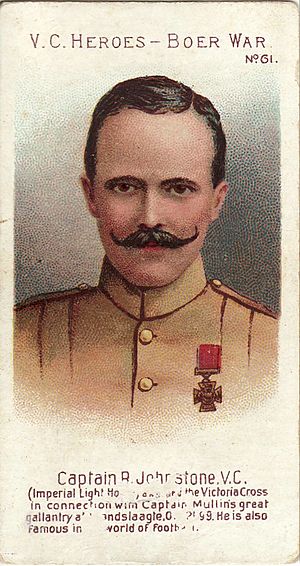Robert Johnston (VC) facts for kids

Taddy cigarette card of Johnston
|
|||||||||||||||||||||||||||||||||||||
| Date of birth | 13 August 1872 | ||||||||||||||||||||||||||||||||||||
|---|---|---|---|---|---|---|---|---|---|---|---|---|---|---|---|---|---|---|---|---|---|---|---|---|---|---|---|---|---|---|---|---|---|---|---|---|---|
| Place of birth | County Donegal, Ireland | ||||||||||||||||||||||||||||||||||||
| Date of death | 24 March 1950 (aged 77) | ||||||||||||||||||||||||||||||||||||
| School | King William's College | ||||||||||||||||||||||||||||||||||||
| Rugby union career | |||||||||||||||||||||||||||||||||||||
|
|||||||||||||||||||||||||||||||||||||
Robert Johnston was an amazing Irish rugby player and a brave soldier. He was born in County Donegal, Ireland on August 13, 1872, and passed away in Kilkenny, County Kilkenny on March 24, 1950.
During a war called the Second Boer War, Robert earned the Victoria Cross (VC). This is the highest award for bravery a soldier can get in the British military. He received it while fighting with a group called the Imperial Light Horse.
He was also a talented rugby player, representing both the Irish national team and the famous British Lions team. Robert is one of only three Irish rugby players ever to win the Victoria Cross. The other two were Thomas Crean and Frederick Maurice Watson Harvey. All three of them played club rugby for Wanderers. In 1896, Robert Johnston and Thomas Crean were also part of the same British Lions team that toured South Africa.
Robert Johnston also attended King William's College. Two other students from this college, George Stuart White and Robert Henry Cain, also won the Victoria Cross.
Contents
Early Life and Education
Robert Johnston was born in a place called Laputa, near Clyhore, in the south of County Donegal. His father, also named Robert Johnston, was a lawyer in County Donegal. Robert went to school at King William's College on the Isle of Man.
Rugby Career
Robert Johnston was a skilled rugby player who played for both his country and a famous international team.
Playing for Ireland
In 1893, Robert played two games for the Irish national team. His first game was on February 4, 1893, against England at Lansdowne Road. Ireland lost that game 4–0. On March 11, he played against Wales at Stradey Park, where Ireland lost 2–0. Robert also had two brothers who played rugby for Ireland.
Playing for the British Lions
In 1896, Robert Johnston was chosen to be part of the British Lions team that toured South Africa. He was one of nine Irish players on the team, which was a large number! Other Irish players included Thomas Crean and Louis Magee. Robert played in three of the four main test matches against the South African national team.
Military Service and Bravery
After the British Lions tour ended, Robert Johnston and his teammate Thomas Crean decided to stay in South Africa. Robert played rugby for a team called Transvaal and was even their captain in the Currie Cup competition.
In 1899, when the Second Boer War began, Robert and Thomas Crean joined the Imperial Light Horse army unit. Robert eventually became a major, which is a high rank in the army. He had already been a soldier before, serving with the Royal Inniskilling Fusiliers from 1890 to 1894.
He served in South Africa from 1899 to 1901 and was seriously injured during the Siege of Ladysmith. In October 1899, during a battle called the Battle of Elandslaagte, Robert Johnston, who was a captain at the time, earned his Victoria Cross.
The official statement about his bravery, which also included Captain Charles Herbert Mullins, said:
On the 21st October, 1899, at Elandslaagte, at a most critical moment, the advance being momentarily checked by a very severe fire at point blank range, these two Officers very gallantly rushed forward under this heavy fire and rallied the men, thus enabling the flanking movement, which decided the day, to be carried out.
This means that when the soldiers were stopped by heavy enemy fire, Robert Johnston and Captain Mullins bravely ran forward under the bullets to encourage their men. This helped their side win the battle.
Robert was badly wounded, and Thomas Crean helped nurse him back to health. In 1901, Robert traveled to London, where he and Captain Mullins received their Victoria Cross medals from King Edward himself. Robert also received other medals for his service in South Africa.
Later Life
In 1911, Robert Johnston returned to Ireland and started working for the Irish Prison Service. He was in charge of a prisoner-of-war camp at Oldcastle from 1914 to 1915. He then became the Governor of a prison at Maryborough in 1915, before going back to Oldcastle in 1916. In 1918, he became a resident magistrate, which is a type of judge.
He later settled in Kilkenny, where he passed away. He was buried in St. Mary's Churchyard in Inistioge, County Kilkenny.
In 2019, a documentary called "Mark Our Place" was made about Robert Johnston and the other Wanderers Victoria Cross winners, Thomas Crean and Frederick Maurice Watson Harvey.
Images for kids


